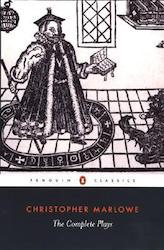
Many readers have suggested that had Christopher Marlowe not been killed at age 29, he would have rivaled or surpassed Shakespeare as the preeminent Elizabethan playwright. I don’t see it, at least not based on the evidence of Doctor Faustus.
It’s a simple morality play and quasi-tragedy, but I don’t see anything approaching the dramatic impact or artistic quality of Shakespeare’s works. So let’s skip the unnecessary comparisons and talk about what Doctor Faustus actually is.
The story is well-known so I’m not going to be careful about spoilers. If you want to read it without knowing the details, stop reading this here….
… Still with me? Ok, then.
Doctor John Faustus is a theology scholar at Wittenburg University in Germany (the university where Hamlet studies in Shakespeare’s play). He’s a brilliant scholar, but he’s bored with academic studies and thinks philosophy, medicine, law, and theology have little to offer him intellectually. So he invites two magicians to teach him black magic and he decides he wants to become like a god and conquer the world.
In toying with conjuring, he attracts the attention of one of Lucifer’s devils, Mephistopheles, who appears to Faustus to see if he can steal another soul. Mephistopheles entices Faustus, and the professor offers to make a bargain with Lucifer. In exchange for twenty-four years of powers and knowledge (and Mephistopheles’ help), Faustus offers Lucifer his soul.
Of course, it’s a fool’s bargain, but Faustus is so full of pride he thinks he’s more clever than Lucifer and is immune from real punishment, especially when Mephistopheles tells him that Hell isn’t an actual place. Everyplace is Hell when one is cut off from God. Faustus can live with that.
Over the following twenty-four years, Faustus doesn’t conquer anything. Instead he’s essentially reduced to traveling throughout Europe, doing party tricks. And in the end, of course, Lucifer claims his half of the bargain.
The play is very clearly about the danger of pride. In the Prologue, Marlowe makes a reference to the fall of Icarus. In the discussion before Faustus signs the bargain, Mephistopheles goes over the history of Lucifer, who was cast out of Heaven because of pride. And at several times throughout the play, Faustus is given an out by good angels and others who try to get him to repent and turn back to God before it’s too late. Faustus either rejects that path because he still believes he’s better than mere mortals, or later because he thinks he’s beyond redemption.
There are several other ideas at play as well–mercy, free will, Faustus’ flawed judgment–but ultimately pride is the Deadly Sin that does him in.
The play’s brief, just fourteen scenes in the standard edition, and reasonably easy to read. And, of course, there are other important versions of the story, too (e.g., Goethe’s Faust). But even though I don’t think this puts Marlowe in Shakespeare’s league, it’s worth a read.
It’s a simple morality play and quasi-tragedy, but I don’t see anything approaching the dramatic impact or artistic quality of Shakespeare’s works. So let’s skip the unnecessary comparisons and talk about what Doctor Faustus actually is.
The story is well-known so I’m not going to be careful about spoilers. If you want to read it without knowing the details, stop reading this here….
… Still with me? Ok, then.
Doctor John Faustus is a theology scholar at Wittenburg University in Germany (the university where Hamlet studies in Shakespeare’s play). He’s a brilliant scholar, but he’s bored with academic studies and thinks philosophy, medicine, law, and theology have little to offer him intellectually. So he invites two magicians to teach him black magic and he decides he wants to become like a god and conquer the world.
In toying with conjuring, he attracts the attention of one of Lucifer’s devils, Mephistopheles, who appears to Faustus to see if he can steal another soul. Mephistopheles entices Faustus, and the professor offers to make a bargain with Lucifer. In exchange for twenty-four years of powers and knowledge (and Mephistopheles’ help), Faustus offers Lucifer his soul.
Of course, it’s a fool’s bargain, but Faustus is so full of pride he thinks he’s more clever than Lucifer and is immune from real punishment, especially when Mephistopheles tells him that Hell isn’t an actual place. Everyplace is Hell when one is cut off from God. Faustus can live with that.
Over the following twenty-four years, Faustus doesn’t conquer anything. Instead he’s essentially reduced to traveling throughout Europe, doing party tricks. And in the end, of course, Lucifer claims his half of the bargain.
The play is very clearly about the danger of pride. In the Prologue, Marlowe makes a reference to the fall of Icarus. In the discussion before Faustus signs the bargain, Mephistopheles goes over the history of Lucifer, who was cast out of Heaven because of pride. And at several times throughout the play, Faustus is given an out by good angels and others who try to get him to repent and turn back to God before it’s too late. Faustus either rejects that path because he still believes he’s better than mere mortals, or later because he thinks he’s beyond redemption.
There are several other ideas at play as well–mercy, free will, Faustus’ flawed judgment–but ultimately pride is the Deadly Sin that does him in.
The play’s brief, just fourteen scenes in the standard edition, and reasonably easy to read. And, of course, there are other important versions of the story, too (e.g., Goethe’s Faust). But even though I don’t think this puts Marlowe in Shakespeare’s league, it’s worth a read.
 RSS Feed
RSS Feed
